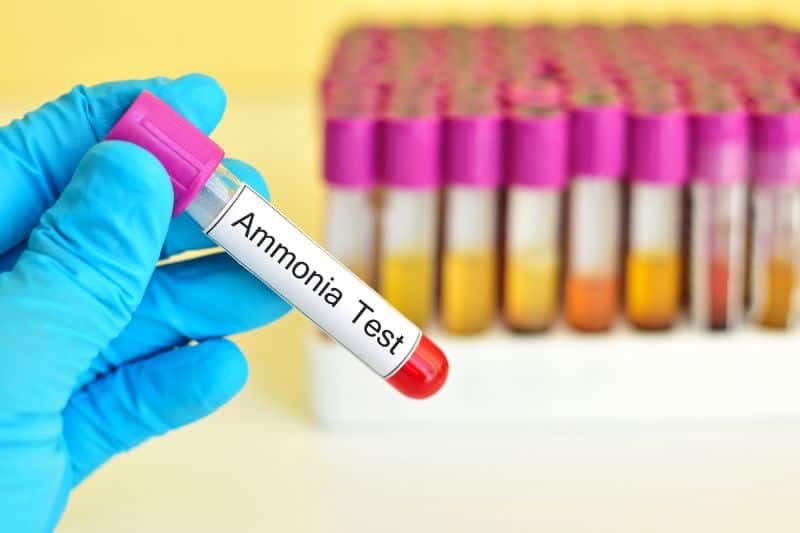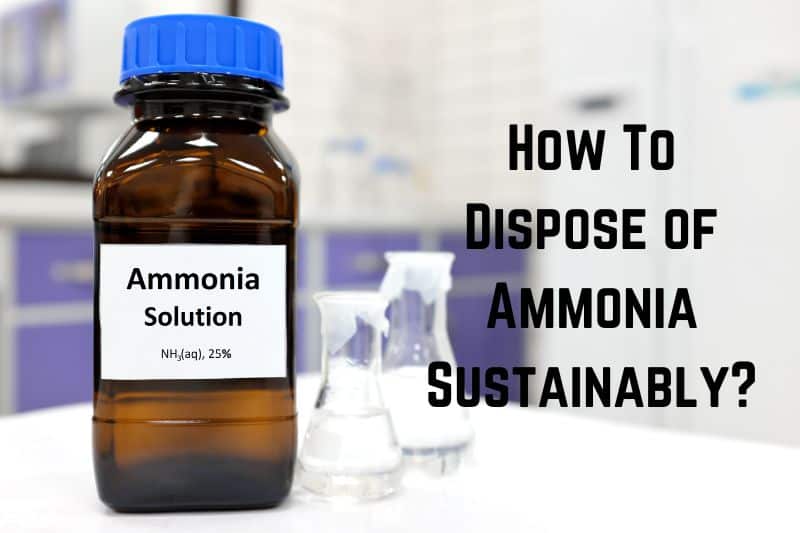Ammonia is a chemical substance used in many industries as a fertilizer, cleanser, and refrigerant. Its worldwide output is anticipated to reach 290 million tons by 2030 due to its wide range of applications. But there is a crucial disclaimer to this ubiquitous use: ammonia has harmful qualities.
That’s why it’s so important for businesses to dispose of ammonia safely. However, what are the procedures for disposing of ammonia, and what rules must you abide by? Let’s examine the specifics of handling and properly disposing of ammonia.
Read: How To Dispose of Acetone Sustainably? (Full Guide)
Various Ways To Dispose of Ammonia
Ammonia disposal must be done correctly to safeguard human health and the environment. If breathed in high enough concentrations, ammonia is extremely poisonous and can lead to severe respiratory issues. Inadequate disposal can cause explosions, damage to wildlife and plants, and soil and water pollution.
Use of Absorbent
Materials used to absorb liquids are known as absorbents. They are very handy for cleaning up minor ammonia accidents. Sand, sawdust, kitty litter, toilet paper rolls, and baking soda are typical absorbents.
All you have to do is scatter the absorbent onto the spill and let it absorb the liquid. After completely absorbing ammonia, remove the absorbent material using a dustpan and brush. Once the ammonia has been fully absorbed, it is crucial to dispose of it properly.
Never empty it into the trash or down the drain. Rather, put it in a container that can be sealed and mark it as hazardous garbage. Contact your local waste disposal facility to find out how to dispose of hazardous material in your area safely.
Dilute With Water
Ammonia is easily diluted with lots of water since it is soluble. You must always employ more water than ammonia; one portion to ten portions of water is the suggested ratio.
Doing this ensures the ammonia is properly diluted and won’t damage the environment or your pipes. There are two ways that you can dilute ammonia. You have two options: flushing it through the toilet or carefully emptying it down the drain while water flows from the faucet.
It is imperative to ensure that the amount of ammonia used does not exceed that of water, particularly if the toilet is linked to a septic tank. This is due to the possibility that ammonia traces could contaminate groundwater and destroy the ecosystem.
Professional Disposal Service
Professional disposal firms offer various services to assist individuals in disposing of ammonia responsibly and safely. These services may include ammonia elimination on-site, hazardous waste removal, and chemical waste pickup.
These organizations guarantee that hazardous compounds, like ammonia, are disposed of ethically and in compliance with local rules and regulations by offering an efficient and secure way for people and companies to do so.

Risks of Improper Disposal of Ammonia
We can lessen ammonia’s detrimental effects on the environment and general public health by preventing inappropriate disposal. Below are the risks of improper disposal of ammonia.
Health Risks to Humans and Animals
Ammonia gas exposure can seriously endanger an animal’s or human’s health. Ammonia can irritate the respiratory tract and harm it when inhaled. A few of the health hazards linked to ammonia exposure include the following.
To Humans
- Respiratory issues: Besides causing wheezing, coughing, and shortness of breath, ammonia can irritate the eyes, nose, and throat. Extended exposure to elevated ammonia gas concentrations may result in more serious respiratory issues, such as pneumonia and bronchitis.
- Itching of the skin and eyes: Ammonia is a caustic gas that can burn and irritate skin and eyes. Always wear safety gloves and goggles when handling the gas to avoid ammonia on your skin or eyes.
- Asthma: Ammonia gas exposure can cause asthma attacks in those with the condition. This is because ammonia can irritate and inflame the airways, making breathing difficult.
To Animals
- Respiration issues: Animals exposed to ammonia gas may develop respiratory issues like people. This is particularly true for pets housed in small, enclosed areas where ammonia concentrations can build up. Long-term exposure to excessive ammonia concentrations can cause fatalities and persistent respiratory problems.
- A decline in output: Ammonia exposure can cause livestock, including pigs, poultry, and cows, to grow and produce less. Farmers and breeders may suffer financial losses as a result of this.
- Stress and behavioral problems: Animals exposed to ammonia may experience stress and anxiety, resulting in behavioral issues like aggression and decreased social relationships.
Economy
Aside from health concerns, the financial effects of pollution from ammonia include the price of cleaning and remediation projects, a decline in the value of properties in contaminated areas, and possible harm to sectors of the economy that depend on reliable water sources.
Environment
Ammonia improper disposal can also have detrimental effects on the ecosystem. Water bodies may get contaminated when ammonia-rich effluents from improper ammonia disposal find their way into the water supply. Aquatic ecosystems may suffer from this, upsetting the water systems’ natural equilibrium.
Furthermore, air pollution and the exacerbation of climate change and global warming are caused by the release of ammonia into the atmosphere. Additionally, it may result in eutrophication, a condition where an overabundance of nutrients in water bodies encourages the growth of hazardous algae and other creatures that endanger aquatic ecosystems even more.
Ammonia can also change soil pH and nutrient levels, impacting plant development and ecosystem health.
Is It OK To Put Ammonia Down the Drain?
Many cleaning solutions contain ammonia, which is not considered a dangerous substance for use in the home. It is safe to pour ammonia down the drain if cold water is running concurrently to dilute it thoroughly.
More water than ammonia ought to be draining out. It is also safe to flush down the toilet. Ammonia and bleach should never be mixed since the resulting gas is toxic. Avoid flushing or spilling ammonia outside if you have a system with septic tanks because it can seep into the ground and contaminate the groundwater.
Swish water over the sink’s surface to eliminate any potential ammonia residue. Ensure that the ammonia is gone by using a fresh towel or rag to wipe off the edges and bottom of the sink. This guarantees that you won’t unintentionally cover it with another chemical.
Is Ammonia a Hazardous Waste?
As a hazardous waste, ammonia can cause pollution and accidents if it is not properly handled. Ammonia has a double-edged effect because of how caustic it is. It works wonders for cleaning up grime and rust, but it can be highly dangerous if it isn’t diluted properly.
It can produce tiny quantities of irritation and substantial amounts of chemical burns when it gets into proximity to the skin. Keep a watch on your eyes because one dangerous element is that the full extent of the damage may only become apparent up to a week following the initial encounter.
Wear a mask, gloves, and eye protection when handling greater concentrations. A face shield and eye protection might not be required for lower amounts, but wear gloves at all times, no matter how diluted!
Additionally, very flammable ammonia should be kept from items that could catch fire. It works wonders as an oven cleaning, but before using it, ensure your oven is turned off, and the primary gas line and pilot light are completely off if it runs on gas.
Read: How To Dispose of a Hot Tub Sustainably? (Read on)
How Long Does It Take For Ammonia To Evaporate?
After the first two minutes in open air, ammonia vaporizes at a rate of 0.12 grams per second under typical conditions. After two minutes, the evaporation rate drops to half the starting rate or 0.06 grams per second.
It is noteworthy that several variables, including temperature, humidity, and wind, can impact the evaporation rate. Ammonia evaporation can occur more quickly at higher temperatures. It tends to evaporate faster in hot climates than in cooler ones.
Ammonia will evaporate more quickly the more surface area it is dispersed over. For instance, a pool of liquid ammonia will evaporate slower than a thin layer of the same substance. The rate of evaporation can also be affected by the ammonia concentration.
FAQ’s
Can ammonia be used as a fertilizer, and is it safe for the environment?
Ammonia is an excellent fertilizer as well. When it was first created, the original purpose was to fertilize crops. Ammonia can be used in the soil directly as a fertilizer or dissolved with water and injected deeply. Make sure ammonia is sufficiently diluted because too much can damage plants.
Can ammonia be recycled or repurposed in any way?
Ammonia can be extracted and refined from industrial processes to be used again in the same or different industries. Furthermore, a few businesses have created technologies to transform ammonia into other beneficial compounds.
Can I dilute ammonia with water before disposal?
If your ammonia solution is highly concentrated, dilute it thoroughly with water before discarding it. Concentrated ammonia disposal might be risky. Concentrated ammonia tends to dilute with water, making it much safer. Diluting concentrated ammonia with flowing water is always the best option.
What are the eco-friendly alternatives to ammonia for cleaning?
Hydrogen peroxide, baking soda, vinegar, and other non-toxic cleaning chemicals are environmentally suitable substitutes for ammonia in cleaning applications.
Conclusion
Ammonia disposal must be done correctly to protect both the environment and people. Determining the kind and concentration of ammonia and adhering to regional laws and safety precautions is critical.
Potential injury can be reduced by adopting the required safety measures, such as donning protective gear, operating in a location with good ventilation, and utilizing the right chemical solutions or diluting techniques.






